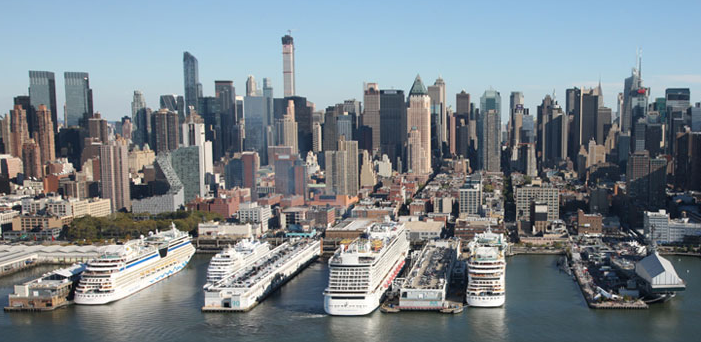Lately, shipping faces more and more pressure to reduce its emissions. Responding to this pressure, the sector is trying to come up with new ideas and solutions to improve the green footprint of ships. From new fuels, to slow steaming it seems that ships have many options, but how about ports? Well, ports can also play a significant role in reducing shipping’s emissions, by using one method: cold ironing.
Cold ironing, also known as shore connection, or shore-to ship power provides shoreside electrical power to a ship at berth.
Namely, when a ship docks, it no longer needs energy for propulsion. However, it still consumes some energy in order to operare certain necessary operations. These operations may include:
- Ventilation;
- Heating;
- Cooling;
- Pumps
- Control systems
- Cargo handling systems.
As a result, the generators keep running, producing local noise and air emissions. In order to prevent that, instead of letting the generators on board make the electricity, this can come from shore power.
The good news is that shore power can be installed for all types of vessel and for all ages with need for power in harbour. In fact, it has been used for years especially for smaller vessels, but also some larger passenger vessels.
However, in order for a port to be considered as eligible to accommodate cold ironing, it must fulfill certain requirements. Namely, on the land side, the high power cold ironing system consists of the following:
- High voltage grid to the port;
- Frequency and voltage convertors/transformers;
- Control panels and connection boxes;
- Cable reel and connectors.
As for the ships, the following will have to be installed:
- Transformer
- Power distribution system
- Control panel
- Frequency converter (optional for greater flexibility)
- Connectors and cable reel (optional for greater flexibility)
Shore power has been used extensively for many years for ships with moderate power requirements, such as less than 50 to 100 kW. The reason for this is that this kind of ships can use normal grid voltage and frequency, as well as replace the energy from the generators with the shore power with marginal investments.
But, let’s take a closer look at the history of cold ironing, to see how this important operation started.
The history of cold ironing
Cold ironing entered into maritime’s life nearly 20 years ago. As a matter a fact, there are reports that this kind of operation was already in use since the 1980s. Specifically, in North America, the cruise industry was among the first to apply shore to ship power, in order to reduce its environmental impact in some sensitive zones, such as Alaska.
After assessing that cold ironing is the most cost effective solution to tackle ship emissions in ports, the US decided to regulate and mandate it for all major ports. The result?
- By 2014, ships without a shore connection system were banned from Californian ports;
- By 2020, 80% of the power used by berthed ships will have to come from shore-side electricity.
Cold ironing is a shipping industry term that first came into use when all ships had coal fired engines. When a ship tied up at port there was no need to continue to feed the fire and the iron engines would literally cool down, eventually going completely cold, hence the term cold ironing.
How can cold ironing help shipping?
If applied correctly, this technology can contribute greatly to air quality improvement. Namely, a study reports that due to the “limiting emissions facilities” in lower plants, cold ironing could save more than 30% of CO2 emissions and more than 95% of nitrogen oxygen and particulate. In ships, the same study finds that in 10 hours of stop of a cruise ship, its emissions fall from 72.2 to 50.1 tonnes of CO2, from 1.47 to 0.04 tonnes of nitrogen oxide, and from 1.23 to 0.04 tonnes of sulphur oxide.
Another important factor is that this system also allows to reduce noise pollution, which is a great problem especially in large cities.
Other positive impacts are:
- Better onboard comfort while in port;
- green profiling for ship owners and customers;
- Reduced lifecycle cost by reduced fuel consumption and maintenance cost.
In view of the above, Roberto Bernacchi, Shore-to-ship power & Smart Ports Global Product Manager, ABB, talked about cold ironing during the 2017 GREEN4SEA Conference.
Mr. Bernacchi highlighted that, amongst the top priorities for enhancing port competitiveness and recognition, an important role is played by the management of air quality, energy efficiency and noise management. Therefore, he said, the answer to those basic needs comes with port electrification and supplying vessels with shore power during their stay at berth.
Nevertheless, Mr. Bernacchi noted that:
The key issue is not the technology itself but the planning. A ‘Synergy’, an effective collaboration is essential to enhance sustainability at ports in order to become a better place to live harmoniously and be satisfied all stakeholders i.e. ports operators, shipowners, regional government, local communities, technology suppliers and port authorities
Barriers for the adoption of cold ironing
Of course, as every technology, shore to ship power, also has its downsides. The most important barriers is the cost. Namely, the consumption of electricity can be enormous because of the size of the ships and tankers.
Contributing to high costs is the necessary infrastructure at marine terminals. These terminals must have extra electrical capacity, conduits, and the ‘plug’ infrastructure, in order to accept power cables from a vessel.
Of course not every ship is compatible and suitable for the process of alternate marine power. Some vessels will have to be equipped with the necessary technology, in order to be able to receive shore to ship powers. According to reports, with a 20-year vessel design life and 6% interest, this translates to an annual cost of US$170,000 for vessel modifications to a fleet of five vessels. In addition to the shoreside infrastructure cost, a total annual construction cost per berth of US$280,000 could be possible.
Without a doubt, cold ironing offers a great solution to further reducing shipping’s emissions. However, in order to be truly considered as an effective solution, it has to show that it can be applied widely, as well as economically.





























































































































